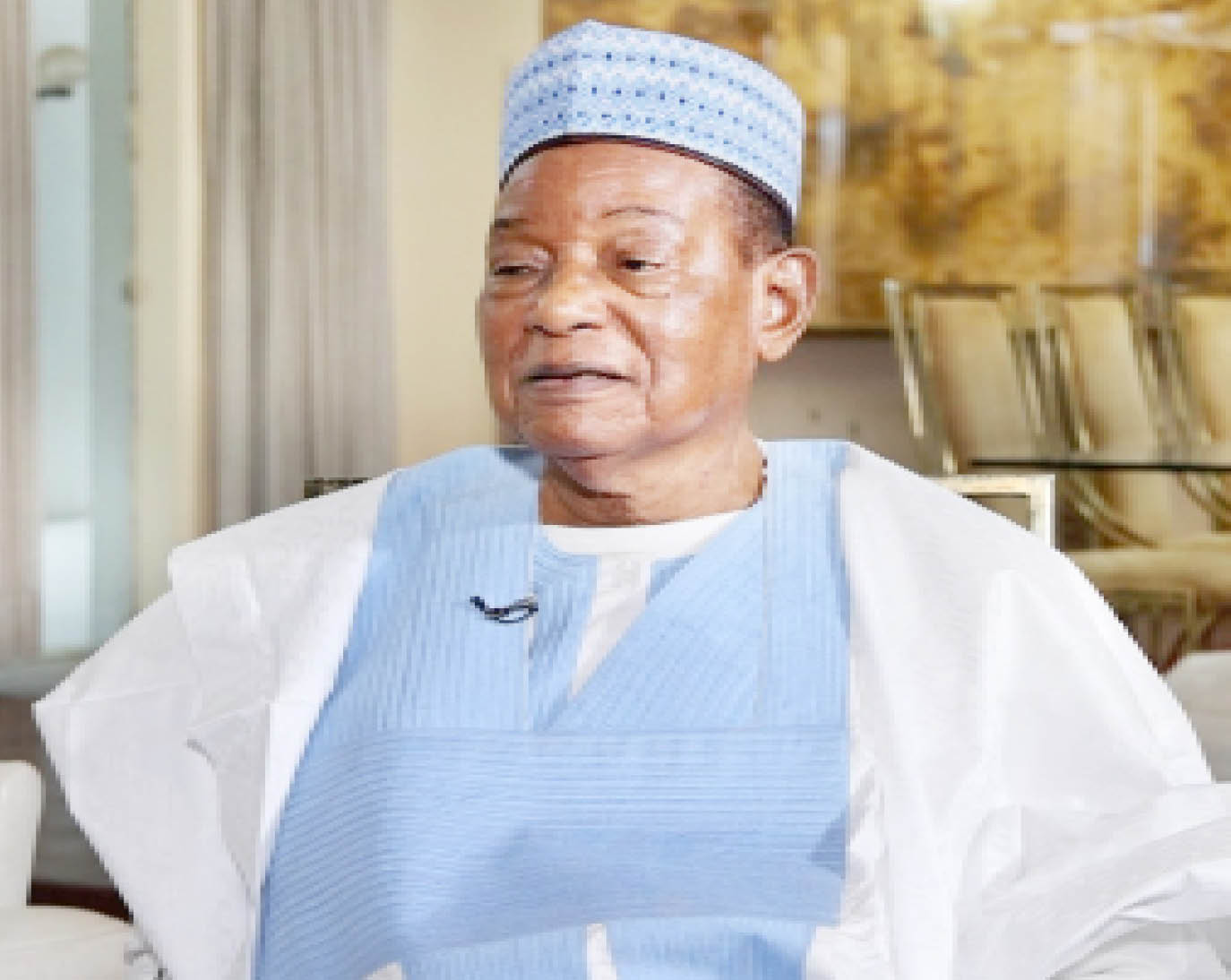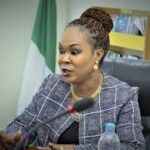Alhaji Lema Jibrilu is the Dan Iyan Katsina. In this interview, the Katsina-born successful businessman, industrialist and politician reminisced on his life and experiences, as well as the problems with Nigeria.
You look like somebody who could be from Mauritania or Western Sahara. Are you from Nigeria?
Your complexion is almost the same as mine, there’s very little difference, if any. My mother was Fulani and my father from Maiduguri.
You attended the elite schools of those days: Katsina College, and I think later on, Barewa College; what was the experience like to be in those schools?
Alhamdulillah, I really didn’t think any different; I didn’t know they were elite colleges. It was only later that I discovered, like you said, that they were top schools. Katsina College was the oldest in Northern Nigeria.
- Why Nigeria’s N261.8bn catfish industry is in danger
- Intrigues, realignment in PDP as North pushes for open contest, South zoning
Incidentally, my father was the first teacher at Katsina College. He went to Gidan Dan Hausa School in Kano in 1908, and when he finished he came and started teaching in Katsina College.
In Barewa?
In those days, Barewa and Keffi were the only secondary schools in the entire northern region. Now, you find some states with 60 secondary schools or even more. So education has gone a long way.
How did you manage to get admission into that kind of competitive place?
You would sit for examination and only those at the top were selected to go. I was fortunate to be among them.
Can you remember some of your classmates?
In Katsina, I was with Bala Adamu, who was from Malumfashi, but he came to school in Katsina; Saidu Barda, who was a former governor of Katsina State; Ali Saulawa, and so on. There are only nine of us still alive, out of 48.
You also had the advantage of going to the United Kingdom early for education, how did that happen?
I worked for the Ministry of Agriculture when I left Barewa College. I didn’t know the criteria, but they selected me to go to Harper Adams Agricultural University, England. I was fortunate; they gave me scholarship. It was later that I found out that it was through hard work and dedication. So I didn’t know the background at all, I was just told to go to college in England.
You were very young then, how did you cope in England?
It was a very difficult transition because first and foremost, the weather was fundamentally different from what I was used to. Fortunately, with time I became adapted to the weather. You had to wear thick clothing, all wrapped up. Gradually, I got used to it because I was there for four years. I came back and worked for two years, I think; then went back for another two years.
The same college?
The same college.
You also went to the United States for courses, was it shortly after that?
No, I went to the US on what they called Eisenhower Fellowship. Out of 48 states I visited 44; it was like a travelling scholarship. First, they provided me a car and we spent three days mapping from coast to coast.
What year was that?
I think it was 1974 or 1976.
It seems you were in all the significant projects and programmes of agriculture. Can you tell us about your career in the civil service?
I started in the Ministry of Agriculture and was posted to Mando Road in the virology lab, so I know all about this COVID some 50 to 40 years ago. I was there when I was selected to go to England.
When I came back it was to the livestock sector, specialising in poultry, husbandry and technology. It was quite an interesting time because there was discipline in those days; you have to do exactly what you were told, with dedication. In those days, Europeans were our teachers. In Barewa College, Zaria, I think we had only three indigenous teachers, the rest were British; and they instilled discipline.
Fortunately, I grew up with discipline from my home because my father was an alkali. I am glad I was brought up with discipline right from the word go because it helped me later in life.
You rose to be a chief livestock officer in the northern region, how did you feel?
Not only in the North, I was the chief livestock development officer for all Nigeria at a time. Of course, I started with the North, so I know the region very well. We had to travel to all the 12 provinces in those days. I helped to establish livestock stations. I grew up through the system, so I knew Nigeria very well, but I knew it even better when I joined politics.
You left the civil service, I think around 1976, and set up your own business. Normally, people like you who are very educated and climbing in the ranks would want to stay and achieve higher status in the civil service, such as becoming a permanent secretary or minister, but you left; why did you take such decision?
I left because I wanted better opportunities than the civil service could offer. It is very true that in the civil service it was only one step left for me to get to the top, but I wanted more challenges.
During my residency and travel to the UK and America I saw tremendous opportunities for the private sector. So when I came back I resigned and ventured into the private sector. And I am more than glad that I did it because of what they call wasted talents in the civil service. You may have ideas, but unfortunately, the system does not allow initiatives to that extent.
But many people will say the private sector is also challenging, especially as industries don’t seem to flourish in Nigeria. You set up Lemaco and were in all sorts of things, including industries. What has been the experience, what have you learned from that and what have you satisfied yourself doing?
I think I learned everything I did. The private sector is a place to be. Till now, the sector is still wide open. We have hardly scratched the surface. But certainly, it has more challenges. It is what you build by yourself rather than the stereotype civil service.
I am more than glad because it really opened my eyes to tremendous possibilities. And we are still not there; the country is still dying for industries, even in agriculture. It has to be different from what we knew, let alone the wider industrial complex of the country.
We are still importing more than 70 per cent of what we use in Nigeria, so you can see the tremendous amount of opportunities and potentials the private sector will provide.
People say you are an expert in agriculture. Commercial farming in Nigeria is still at a poor level. Indeed, gentlemen farmers like you and others have not made a big success of it, is that true?
I was the first to establish a commercial farm in Nigeria, fully mechanised, even from land clearing. At a time in Nigeria I had the largest company in land clearing and planting, up to harvesting, all mechanised. I was the first person to do it on my own. So I succeeded, from that point of view.
I still maintain the two farms I have. I have the largest farms in northern Nigeria; one of them was 4,300 acres and the other 5,300 acres. I am glad I opened the door for commercial agriculture. From that point of view, I would say I succeeded.
Where I failed was as a result of the typical Nigerian scene. They stole me out of agriculture —on a monumental scale—from the seeds to harvest. They would divert what you harvested. They were taking all the tractors. I had 20 tractors at one time and they were giving it on hire without my knowledge, using my diesel and petrol and everything. So it was stealing that made me leave. I still have the two farms, but it is really a great pity that they didn’t allow it to blossom to full potential.
But I was very successful; I was doing up to 60,000 bags of maize, rice, guinea corn, millet. There was nobody bigger than me in those days. From that point of view, I thank Allah for all his mercies.
As an industrialist you set up Lemaco and chemical industries. You were into many things. Is the problem you mentioned the same in other industries?
I set up 22 companies in various sectors of the economy, so I have a bit of experience in industries as well, not only in agriculture. Unfortunately, it is the same thing that really brought a lot of them down—stealing on a monumental scale. They stole me blind. And it is still going on in whatever little we have; they still manage to steal part of it.
Which of these industries are still working?
We still have four or five. We had to scale down because I think I grew up too quickly. As soon as I learnt of one opportunity I would go there full blast, then they went full blast to steal me blind. But Alhamdulillah, I have not done too badly at all.
Most people would say that when you are starting a business, the challenge is capital. What was your experience? Was capital the most important factor for you to succeed? How did you solve the problem of funding?
It is very true that it is quite a struggle to get funding. I don’t think there was a bank I didn’t visit when I started. If I didn’t succeed in one I moved to the next one. So it wasn’t easy at all.
Up till now, I would say that most industrial and agricultural banks are not forthcoming as they ought to. The bureaucracy before you get any loan is unbelievable. You must have the patience of Solomon or Job to be able to succeed.
I was determined to succeed, no matter what. And I think that up to a point, I had succeeded so much. I could have done a lot if the capital was there.
People say one should weigh the risk of taking money from the banks because of the interest and the fact that if these industries don’t do well, they would come to you, and no matter what, demand their money. Did you a problem with debt?
Anybody in business has problems with debt from banks, but we managed to pay all.
Fortunately, it is 100 per cent mine now because I have repaid all the debts. However, it was quite a struggle. I had sleepless nights; I worked 23 hours a day, but Alhamdulillah, at the end of the day I am still intact.
We know that one of the companies associated with you is still there; in fact, it is expanding; that is Delema, the supermarket. Is that your business or your wife’s?
My wife is doing it now. She bought me out. Delema started in Kaduna, then we had one in Funtua and one in Katsina.
Do you have another one in Abuja?
Yes, she started that one.
After you became a successful businessman, suddenly you ventured into politics. Do you think you would have done it again if you had a second chance? Was your action worth it?
Very much; you learn quite a lot in politics. In business they steal you blind, in politics they steal even more.
Anybody who is patriotic cannot avoid politics; and you do it with good intentions. We want to correct things. It is ongoing because you learn every day. We have a long way to go. First and foremost, without justice, the politicians are just like thieves in industries; they want to cut corners and steal. It is terrible.
You came into politics wanting to be president straight away, which is a huge undertaking. Wasn’t the problem because you started at the top?
No. It was not beyond my capacity at all. I can be the president of the United States. I have the capacity, confidence and experience. I have really what it takes to change matters. I went into politics because things were going haywire and there was the need to right the wrongs.
Did you find yourself spending money if everybody who came to you wanted it? Was it all about money? Was that sort of discouraging?
It was nothing discouraging, it was the system. You can’t fight the system. If you can’t join them, they say, avoid them. That’s what I did. I was very careful about most things I did.
Of course I didn’t have the experience when I started. I visited 450 local governments in this country, more than any other aspirant. At that time, the local governments were 600, so I did more 80 per cent.
It was quite an experience. In fact, I didn’t know Nigeria until I went into politics and started visiting places. I learnt quite a lot. And I am still learning because Nigeria is a very complex country; you learn almost daily.

You ran for the office of the president twice, I believe in the National Republican Convention (NRC) and the All Nigeria Peoples Party (ANPP); did you quantify the amount of money you spent?
I didn’t do it; I put it behind me. It would make you go mad.
Are you disappointed with the kind of politics you see now, as well as governance?
It is more than disappointing, to say the least. Nothing is working anymore anywhere in Nigeria today as we used to have. The system has changed completely. Everywhere you go, people want to make money by hook or by crook. We have become so money conscious, and that is really destroying our psyche.
It is unbelievable that whatever you touch has to do with money. That is not how things ought to be. By all means you can’t ignore money, but not to the extent we do it in Nigeria today.
The fact is that in the system, if you don’t have money, nobody respects you, even in your household. If you don’t have money in today’s Nigeria, nobody pays attention to you at all; this is why people are fighting tooth and nail to make money, no matter how corrupt. But fortunately, we still have a lot of people that are thoroughly honest in their dealings. That’s what keeps the country going.
There was the impression that you were close to the Abacha government, is that true?
Yes, he was a friend. We used to play tennis in Kaduna. All the people we played tennis with benefitted from that association. Abacha made people like Macido Dalhat and David Sadauki ministers, while Gidado Idris became secretary to the government. In fairness, Abacha offered me whatever I wanted; I was the one who didn’t take them up.
In the end, he said I should help to establish something, but the name just escaped me. I was the chairman. It was the apex body that saw about investments in Nigeria. The office is opposite Hilton [Nigerian Investment Promotion Council, NIPC].
I worked in a bank as one of the project managers long before the Abacha era.
Do you also have a long standing relationship with President Muhammadu Buhari?
I don’t have any relationship with Buhari. We know each other and are from the same state. He was a regular visitor here through his nephew, Mamman Daura, who was my classmate. He was the one who first brought Buhari here, but I never had anything to do with him or his government.
During his military regime I saw him only once, in official capacity. I was the vice president of the Manufacturers Association of Nigeria. It was in this capacity that the system appointed me as one of the members to promote investments in Nigeria.
I never had anything personal or official with him, but we were friends because of his nephew, Mamman Daura; that is all.
One very significant thing about you is that you are one of the most tax-compliant people in Nigeria, even when businesses are not paying taxes. Is it a policy you adopted personally?
As I told you, my father was an alkali, so I saw people prosecuted for taxes, so I learnt that once you are not honest you are likely to be prosecuted. That’s how I was brought up. That’s why I am tax-compliant. In fact, I was the highest taxpayer in Nigeria as a whole.
Right now?
Yes, not the total amount, not big amount, but compliance, proportionate. Alhamdulillah, honesty is the best policy.
Did the system reward you for this civic responsibility?
They said ‘thank you.’ I have not been rewarded at all, but at least I am being recognised as an honest person, which is more than anything, including monetary things.
When you became a presidential candidate, a lot became known about your life, one of which is that you are actually married to somebody who is not a Nigerian; how did that come about?
It is the truth.
How did you meet and marry her?
It was during my business trip to Brazil.
I guess she has become more or less a Nigerian.
She is fully a Nigerian now. She has Nigerian citizenship.
In your career as a young man, which countries did you enjoy visiting?
As I told you, I visited 44 states in the United States. I also visited countries in Europe. I visited the UK, Australia, India, Pakistan, Saudi Arabia 50 times. I have seen the world; that is what enhanced my experience. I have seen how things are being done differently from what happens in your own country. I am very glad I did.
Which of the countries are your favourite?
Well, many are positive while very few are negative. In fact, they are all positive, as far as I am concerned because they all broaden your horizon. I am glad I visited them.
What hobbies and activities do you do?
I started with tennis, but when my strength started to wane, I went to golf. These are the two games I play fervently. I enjoy golf more than tennis because tennis is more physical. The best exercise of is golf.
I could also walk 6 to 7 kilometres in a day; that’s what keeps me going, except in the last six months when I had a problem with my toe and can’t even balance, let alone wear golf shoes. So I haven’t played golf in the last six months.
I have visited all the hospitals in England and Dubai, but the problem persists. But as soon as I get better, I will go back to golf. I enjoy it and it is a good exercise.
How do you spend a typical day now that you are more or less retired from active business?
Not more or less, I am retired. Well, I take it easy as a retired person. I don’t dabble into businesses and all the activities I used to do. I rely on or follow little investments I have; that’s all.
I monitor my investments; that is what I do, normally. I sleep and wake up when I like. But given the religious hours, we have to do the compulsory calls.
Are there friends you see regularly and share time with?
There is always something almost each week—wedding ceremonies, burials. There’s always something to do, socially.
How would you advise a young person who wants to live a long and successful life like you?
I will advise him to take it easy because that was what I did. I don’t push myself beyond limit. Of course everybody wants to live well, so I try to live well within my income and maintain my health. That’s why I do sports. So try to do exercise, no matter how little; it helps tremendously. It enhances your health very much. I am very glad I played golf until when my foot started hurting. That really kept me going.
What about food; are there things you should watch out for, things to eat or not to eat?
Very much so. Fortunately, I did animal science, which is almost the same as human, so I know what to eat or avoid. I am very careful about what I eat.
So what don’t you eat?
What I don’t eat is not eatable.
So the rule is: eat what you want but in moderation?
Not only in moderation, it is good to eat the right type of food, whether it is carbohydrate, protein, vitamins, etc. It is good if you know the science like I do.
Finally, what would you want to be remembered for? What contribution have you made to this country that you think is unique?
I will let the posterity decide. You cannot say anything good or bad about yourself, the society is watching whatever people do, so let the society decide whether I have done good or otherwise.
I am quite satisfied with the little contribution I made to the socio- economic development of this country.

 Join Daily Trust WhatsApp Community For Quick Access To News and Happenings Around You.
Join Daily Trust WhatsApp Community For Quick Access To News and Happenings Around You.


